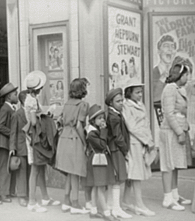
"Children in front of moving picture theater, Easter Sunday matinee, Black Belt, Chicago, Illinois" (Detail)
Credit and Original Image
Search this site:
Campus Resources
Doc Films
Formed in 1932, Doc Films is the longest continuously running student film society in the United States . Dedicated to providing a low-cost, high-quality venue for the screening of American and international films, the society exhibits films every night of the academic year, and most nights during the summer.
Doc Films regularly features Black films on its calendar of nightly screenings (see the current calendar), as well as special events, such as the screening of Brother Outsider: The Life of Bayard Rustin (the award-winning documentary film about dynamic but overlooked organizer of the 1963 March on Washington), featuring the filmmakers and post-screening discussions among students, alumni and community members about race, sexuality, activism and the legacy of the Civil Rights Movement.
Doc Films frequently presents entire series organized around films by and/or about people of African descent, such as:
Images of the American Negro on Film (Winter, 1962)
This extraordinary series represents an early effort by University of Chicago students (particularly chair William D. Routt) to provide a survey of representations of Black people in cinema, notably before the wave of scholarship in this area in the 1970s. The series featured detailed program notes providing rich historical and critical commentary for films including 1890s Edison shorts and D. W. Griffith’s The Birth of a Nation (1915), and then for films examining Negro’s role as “actor” (Paul Robeson in Song of Freedom 1937), “neighbor” (Lost Boundaries 1947), and “friend” (Edge of the City, 1955), concluding with the Chicago premiere of Come Back, Africa (1960).
LA Rebellion (Spring 1997)
A sampling of films by the pioneering group of Black filmmakers who studied at UCLA between the late 1960s and the late 1970s. Inspired by protest and Third Cinema movements, these filmmakers developed alternative representational strategies to those found in white-centered Hollywood films and in Blaxploitation fare. Featured directors included Haile Gerima (Bush Mama, 1974), Julie Dash (Daughters of the Dust, 1992) and a visit and Q & A session with Charles Burnett with the screening of his film To Sleep With Anger (1990).
Black Musicals (Winter 1998)
A survey of Black-cast musicals, from the dawn of the sound era (Hallelujah!, 1929) through classical Hollywood era (Stormy Weather, 1943; Carmen Jones, 1954), and into the age of hop hop and MTV (Krush Groove, 1985; Purple Rain, 1984). Each feature was preceded by the screening of an early musical short, featuring classic Black artists including Duke Ellington, Bessie Smith, Lena Horne and Louis Armstrong.
Newsreel: 30 Years of Radical Media (Fall 1998)
A series celebrating the 30th anniversary of Newsreel, a media collective that has produced and distributed hundreds of independent, politically-engaged films and videos, many focused on the struggles of people of color. Featured a visit by New York Newsreel/Third World Newsreel, co-founder. Allan Siegel.
Race Movies: Black Cinema Before 1950 (Winter 2002)
Presented in conjunction with Prof. Jacqueline Stewart’s course, “A Separate Cinema? Race Films in Context,” this series presented a range of early Black-cast films. The first half of the series featured live jazz accompaniment to silent films, including The Damian Espinosa Trio with Oscar Micheaux’s Body and Soul (1925), and Fred Anderson and Tatsu Aoki with The Scar of Shame (1927, Colored Players of Philadelphia). Another highlight of the series was the enthusiastic dialogue among large, diverse audiences following each screening.
The Devil Finds Work: Sidney Poitier and Cinema of the Civil Rights Era (Winter 2003)
Organized by Terri Francis (graduate student, English), the series offered a forum and a context for rediscovering Poitier’s films just after his receipt of the Lifetime Achievement Award at the Oscars. The series included Cry, the Beloved Country (1951), Blackboard Jungle (1955), The Defiant Ones (1958), and Guess Who’s Coming to Dinner (1967), along with shorts from that era that address issues of racial integration and conflict. and a closing panel discussion co-sponsored by the Race/Film Study Group.
Spike Lee (Spring 2004)
The series surveyed Lee’s career from his NYU thesis film Joe’s Bed-Stuy Barbershop: We Cut Heads (1984) to his groundbreaking Do the Right Thing (1989) to his exploration of the Bronx, Summer of Sam. Presented in conjunction with Prof. Jacqueline Stewart’s course on Lee, the series featured post-screening discussions led by faculty and graduate students (Quincy Mills, Melissa Harris-Lacewell, Damon Phillips, W.J.T. Mitchell, Travis Jackson, Waldo Johnson, Tanji Gilliam, Cathy Cohen and Danielle Allen).
Hip Hop: Yes Yes Y’All (Spring 2004)
A collection of fiction films and documentaries tracing the elements of hip hop culture, its history, practioners, and icons, as well as works inspired by its massive influence. Films included: Wild Style (1982), Beat Street (1984), Ghost Dog (1999), Wave Twisters (2001) and Breath Control: The History of the Human Beat Box (2002).
Doc Films screenings take place in the state-of-the-art Max Palevsky Cinema, which boasts two Eastman 25 16mm projectors and two Simplex 35mm projectors with Christie xenon lamphouses. The projectors' variable speed (usable for both 35mm and 16mm formats) and Doc's full silent image capability allow Doc Films to present silent films in the closest approximation to their original exhibition conditions. The theater's Dolby Digital and Digital Theater Systems (dts) audio systems meet the highest standards in digital sound.
Doc Films
Max Palevsky Cinema , Ida Noyes Hall
The University of Chicago
1212 East 59th Street
Chicago , IL 60637
773-702-8574